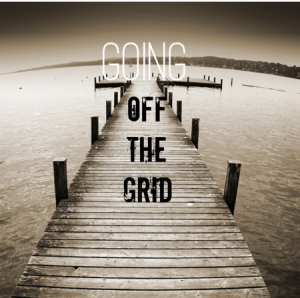There’s been a lot of talk about getting and living off the grid lately;
Not just from Preppers and survivalists, but others as well. It seems that people are starting to wake up to the idea of how dependent we are on the massive infrastructure we’ve built and are getting tired of paying their monthly bills to the power company, the water company, the gas company and everyone else. Maybe it’s just that people are looking to save money, but I think there’s something more to it than that.
Let’s be clear here. Getting off the grid means disconnecting yourself from the utilities that we all depend on. That can include everything from water to the internet and actually consists of more than most of us bother thinking of.
Let’s make a list:
- Electricity
- Water
- Sewage
- Natural gas or propane
- Telephone
- Internet
- Garbage collection
These are things that we don’t think of in our modern society. We’re used to society providing them for us. While it might be nice to be able to turn on the faucet and get a glass of water or flip a switch and have a light turn on, it can be expensive as well. While part of the blame goes to the utility companies, most of it actually needs to go to our own lifestyles. We’ve become accustomed to having all those conveniences, so we have to pay for them.
When most people talk about getting off the grid, they’re really talking about a partial solution.
Few actually want to disconnect from everything; rather, they want to disconnect from the electrical grid, so that they don’t have to keep paying those expensive bills. While it’s possible to get completely off the grid for all your utilities, it’s a lot of work to do so.
The biggest drawback in getting off the grid is that it takes a large up-front investment to do so. If you want to avoid paying your water bill, you’ve got to put in a well. Depending on where you live and how deep the water table is, that might cost you upwards of $10,000. Putting in enough solar panels so that you don’t need to pay an electric bill will cost you somewhere north of $30,000. Even cutting off the natural gas and heating your home with wood will require a couple of thousand dollars in investment. These are some pretty major investments for most people.
That’s not to say it’s not worthwhile.
If you spend that $30,000 on covering your roof with solar panels, you’ll be able to eliminate your $300 per month electric bill. While that will take you a bit over eight years to pay off, once you’ve paid for it, you’ve got free electricity for another 17 years or so. Over the long term, it definitely pays off.
But that’s not the only reason you should consider getting off the grid. While it will save you money in the long run, the bigger reason for getting off the grid is to give your family security. Our complex infrastructure is highly vulnerable to breakdown and attack. Of all of it, the electrical grid is the most fragile. Every storm that blows through seems to leave people without electricity. In the case of a major storm, such as a hurricane, they can be without electricity for weeks.
The electrical grid isn’t the only fragile part of our grid.
Last year, a chemical spill into a river left whole towns without water for a couple of weeks. The only saving grace in that situation was that it happened in an area that isn’t heavily populated. If that had disrupted the water supply to a major city, people would have died.
There’s a good reason why many preppers are concerned about the grid and about the risk of terrorist attack against it. That’s because the grid isn’t protected at all. Attacking the grid and taking out our electricity or water would be a fairly simple, low-risk operation for any terrorist organization. And don’t think they can’t do it either. Today’s terrorist organizations are much more sophisticated than they look. We’ve given them the technical educations that they need to do just about anything.
An EMP, probably the worst possible attack on our infrastructure, could be launched off of a freighter; it wouldn’t take a naval vessel. The infamous Scud missile, as unsophisticated as it is, can launch a nuclear warhead to an altitude of 150 kilometers. That’s high enough for an EMP attack, shutting down the majority of the country’s electrical grid.
While that same EMP could end up frying your own electrical generating capability, that’s actually not the biggest problem you’d have. Generating electricity, if all your electronics are fried, isn’t going to do you a whole lot of good.
Actually, not all your electronics would be fried.
While you could count on your computer, cell phone and television going dead, simple electrical devices, such as washing machines would probably still survive. These would not be affected, because they don’t use any solid-state electronics. So, if you had a spare voltage inverter stashed away in a faraday cage to replace your fried one, you could at least have lights and appliances working.
To get back to our original question; is going “off grid” the smart way of doing things?
I’d have to answer that with a resounding yes. However, I’d like to add one qualification. That is to keep your connection to the grid intact, just don’t use it. Redundancy for any critical system is important, and if you stay connected to the grid, even while not using it, you can be sure that you’ll have a backup, just in case your systems happen to go down.
Besides, staying connected to the grid is good camouflage.
As long as you’re connected, nobody’s going to wonder why you’re not using it. But as soon as you disconnect, government officials and other busybodies will be poking around to see what you’re up to. That can be bad for your OPSEC. There have even been a few cases of homeowners who went off the grid being taken to court or fined for doing so. As long as you’re still connected, that’s not likely to happen.









